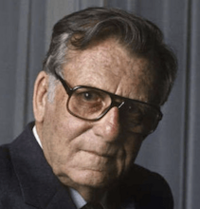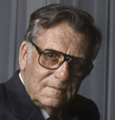Morris West facts for kids
Quick facts for kids
Morris West
|
|
|---|---|

Morris West
|
|
| Born | Morris Langlo West 26 April 1916 St Kilda, Victoria, Australia |
| Died | 9 October 1999 (aged 83) Clareville, New South Wales, Australia |
| Pen name | Michael East, Julian Morris |
| Occupation | Writer |
| Nationality | Australian |
| Period | 20th century |
| Genre | Literary fiction |
| Notable works | The Shoes of the Fisherman, The Devil's Advocate |
| Notable awards | James Tait Black Memorial prize 1959 |
Morris Langlo West (born April 26, 1916 – died October 9, 1999) was a famous Australian writer. He wrote many novels and plays. Some of his most well-known books include The Devil's Advocate (1959) and The Shoes of the Fisherman (1963).
His books were very popular around the world. They were translated into 27 languages. More than 60 million copies of his books were sold. After he became a famous writer, each new book he wrote sold over one million copies.
Morris West often wrote about world events and the role of the Roman Catholic Church. For example, in The Shoes of the Fisherman, he wrote about a Pope from Eastern Europe. This was 15 years before Pope John Paul II, who was from Poland, became Pope. In another book, The Clowns of God, he wrote about a Pope who resigned. This happened 32 years before Pope Benedict XVI resigned in 2013.
Contents
Morris West's Early Life and Education
Morris West was born in St Kilda, Victoria, Australia. His father was a salesman. Because his family was very large, Morris lived with his grandparents. He went to Christian Brothers College, St Kilda. In 1929, he won a special award there.
When he was 14, Morris joined the Christian Brothers seminary. This was a place where he could study to become a religious brother. He said it was a "refuge" from a difficult childhood.
From 1934 to 1939, he taught at schools in Tasmania and New South Wales. During this time, he also studied at the University of Tasmania. In 1940, he decided to leave the Christian Brothers. He then worked as a salesman and a teacher.
Serving in the Air Force
In April 1941, Morris West joined the Royal Australian Air Force. He became an officer and worked with secret codes. He was later stationed in Gladesville, New South Wales. For a while, he also worked for Billy Hughes, a former Australian prime minister.
His first book, Moon in My Pocket, was published in 1945. He wrote it while he was still in the air force. He used the pen name "Julian Morris" for this book. It sold over 10,000 copies.
Becoming a Radio Producer
After the war, Morris West worked at a radio station in Melbourne. He was the publicity manager. Soon, he started making radio plays. From 1945 to 1954, he had his own radio production company called ARP. For ten years, he focused on writing, directing, and producing radio shows.
He created many radio plays, such as The Mask of Marius Melville (1945) and The Enchanted Island (1952). The hard work and personal challenges led him to a nervous breakdown. He decided to sell his company to focus only on writing books.
Morris West: A Best-Selling Novelist
Morris West started writing novels under his own name. His first was Gallows on the Sand (1955), which he wrote in just seven days. He then wrote Kundu (1956), an adventure story. He also wrote a play called The Illusionists (1955).
He moved to Europe with his family. His third novel was The Big Story (1957). This book was later made into a movie called The Crooked Road (1965).
While in Naples, Italy, he met Father Borrelli. Father Borrelli worked with children living on the streets. This meeting inspired West to write Children of the Sun (1957). This non-fiction book became his first international success. He also wrote The Second Victory (1958). He used the pen name "Michael East" for another book, McCreary Moves In (1958).
Worldwide Success
Morris West's first best-selling novel was The Devil's Advocate (1959). He spent two years writing it. He sold the rights to make it into a movie for $250,000. It was also turned into a play. West later said this novel earned him millions of dollars.
He wrote another "Michael East" novel, The Naked Country (1960). Daughter of Silence (1961) was also made into a play.
From 1956 to 1963, he worked as a reporter for the Daily Mail newspaper in the Vatican. His son, C. Chris O'Hanlon, said that he spent his first 12 birthdays in 12 different countries.
The Shoes of the Fisherman (1963) was a huge success. It sold over six million copies and was made into a movie.
He continued to write many popular novels, including The Ambassador (1965) and The Tower of Babel (1968). He also wrote a non-fiction book about the Roman Catholic Church.
In 1973, his play The Heretic was performed in London. By 1981, his books had sold over 25 million copies. He wrote the play The World is Made of Glass in 1982. He later turned this play into a novel.
Returning to Australia
In 1982, Morris West moved back to Australia. He wrote more novels, such as Cassidy (1986), which became a TV mini-series. Other later books include Masterclass (1988) and Lazarus (1990).
In 1993, West announced he would stop writing. A special dinner was held to honor him. However, he found he couldn't stop. He wrote three more novels and two non-fiction books. These included Vanishing Point (1996) and Eminence (1998). He also wrote his memoir, A View from the Ridge (1996).
He was working on his novel The Last Confession when he passed away. This book was published after his death in 2000.
Morris West's Writing Style
Morris West wrote quickly and didn't change his work much. His first handwritten draft was often very similar to the final printed book. Even though he won many awards and sold millions of books, some Australian literary critics did not fully accept him. The 1998 Oxford Literary History of Australia noted that he was "surprisingly neglected" by critics.
He received the 1959 James Tait Black Memorial Prize for The Devil's Advocate. In the early 1960s, he helped start the Australian Society of Authors.
The Last Confession
Morris West died while writing the last chapters of his novel The Last Confession. This book was about Giordano Bruno, a thinker who was burned at the stake in 1600. West had always felt a connection to Bruno. In 1969, he had written a play about Bruno called The Heretic. He said this play had "the most of me in it."
The Last Confession was written as if it were Bruno's diary. West wanted it to cover the last few months of Bruno's life. However, West only completed 14 days of the diary before he died. The last words he wrote were: I can write no more today … who knows to what nightmares I might wake.
Morris West had several heart attacks and surgery. A writer named Murray Waldren noted that the book was written by a man who knew death was near, about a man who knew execution was near. West's family decided to publish the book as it was, unfinished. This allowed readers to imagine the ending themselves.
Morris West's Family Life
Morris West was born on April 26, 1916. He had two children with his first wife, Elizabeth Harvey. Their daughter, Elizabeth, became a nun. Their son, Julian, was a wine-maker.
Morris and Elizabeth divorced. He then married Joyce "Joy" Lawford. Because his first wife was still alive, he faced challenges with the Roman Catholic Church regarding his second marriage. He was not in full communion with the Church for many years. However, he always considered himself a devoted Catholic and attended Mass every Sunday.
Morris and Joy had four children together. One son, C. Chris O'Hanlon, changed his name to feel more independent. He tried to become a writer like his father but found it wasn't for him. Chris later founded an internet design company.
Another of West's sons, Mike, is a musician. He was in a band called Man from Delmonte. He also releases solo albums. Morris West's grandson, Anthony (Ant) West, is also a musician. He was in the band Futures and is now in the group Oh Wonder.
Morris West passed away at age 83 on October 9, 1999, in Clareville, New South Wales.
Honors and Awards
Morris West received several important honors. He was appointed a Member of the Order of Australia in 1985. This is a high honor in Australia. In 1997, he was promoted to Officer of the Order of Australia.
Images for kids
See also
 In Spanish: Morris West para niños
In Spanish: Morris West para niños
 | Percy Lavon Julian |
 | Katherine Johnson |
 | George Washington Carver |
 | Annie Easley |


